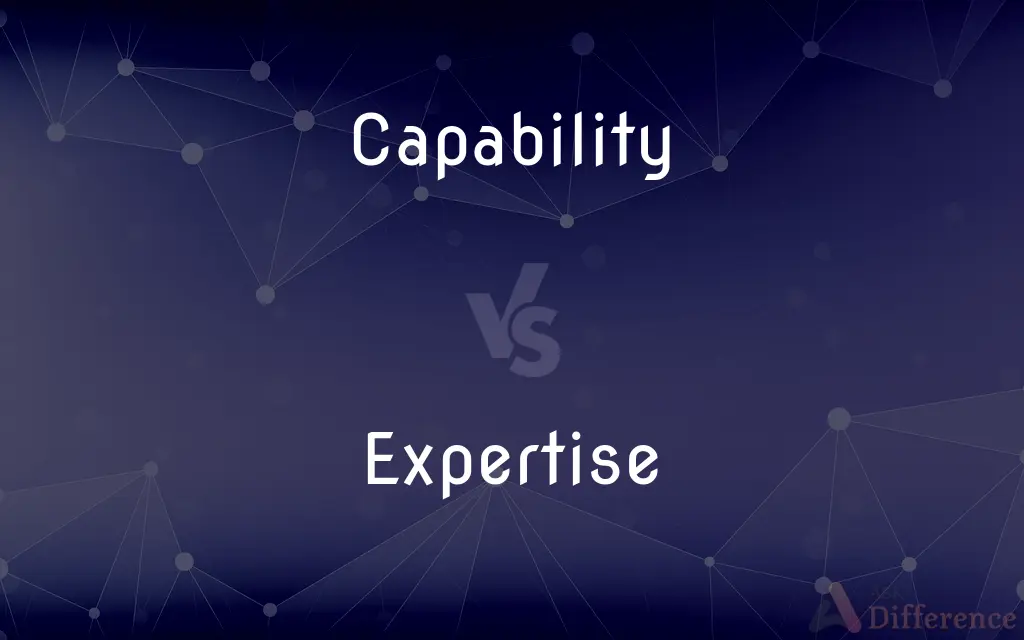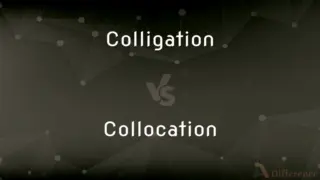Capability vs. Expertise — What's the Difference?
By Fiza Rafique & Maham Liaqat — Updated on April 3, 2024
Capability refers to the ability or capacity to do something, often implying potential, while expertise is a high level of skill or knowledge in a particular area, developed through experience and education.

Difference Between Capability and Expertise
Table of Contents
ADVERTISEMENT
Key Differences
Capability is a broad term that encompasses an individual's or organization's potential to perform tasks or achieve objectives. It suggests the presence of necessary skills, resources, or power but does not necessarily imply mastery or high proficiency. For example, a company might have the capability to enter a new market, indicating it has the resources and basic skills needed. On the other hand, expertise is a specific, advanced level of understanding or skill in a certain area, acquired over time through education, training, and practical experience. An expert in a field, therefore, not only understands complex aspects of that area but also knows how to apply this knowledge effectively.
While capabilities may form the foundation upon which expertise is built, the development of expertise requires deliberate practice, study, and application in a particular field. A person might have the capability to learn multiple languages due to their memory and cognitive skills, but they only attain expertise in a language through focused study and use. Conversely, expertise in a particular area enhances an individual's capabilities, making them more versatile and effective in related tasks or fields.
Capabilities often represent a broader potential that can be directed towards various ends. For instance, a business might have the financial capability to invest in different projects, but having expertise in market analysis will determine where the investment is likely to succeed. Expertise, therefore, implies a depth of knowledge and skill that enables individuals or organizations to navigate complex challenges, make informed decisions, and achieve high levels of performance in specific domains.
In terms of development and assessment, capabilities are usually identified through a general evaluation of skills, resources, and potential, often in a broad context. Building expertise, however, involves a focused and sustained effort to deepen knowledge and improve skills in a specific area. This process is usually marked by achievements, certifications, or recognition by peers, indicating a person's advanced understanding and proficiency.
The relationship between capability and expertise is dynamic. As individuals and organizations grow, they expand their capabilities, which in turn may lead to the development of new areas of expertise. Conversely, the deepening of expertise in a certain area can open up new possibilities and capabilities, reflecting a continuous cycle of growth and improvement.
ADVERTISEMENT
Comparison Chart
Definition
Ability or capacity to do something
High level of skill or knowledge
Implication
Potential, general ability
Mastery, specialized proficiency
Development
Broad skill acquisition, resource gathering
Focused practice, education, experience
Measurement
Evaluated by potential and resources
Demonstrated through performance, recognition
Scope
Broad, versatile
Narrow, specialized
Application
Various tasks and fields
Specific tasks within a field
Impact on Performance
Provides foundation for performance
Enhances quality and efficiency of performance
Growth Dynamics
Can lead to the development of expertise
Can expand capabilities in and beyond a specific area
Compare with Definitions
Capability
Can be broad and versatile.
Her academic capabilities span several disciplines.
Expertise
Acquired through extensive experience and study.
She gained her expertise in marketing over a decade of work.
Capability
The potential to achieve tasks or goals.
The team's diverse capability allowed for successful project completion.
Expertise
Deep knowledge or skill in a specific field.
His expertise in cybersecurity is widely recognized.
Capability
Involves resources and skills available.
With ample resources, the company has the capability to expand overseas.
Expertise
Demonstrated by high-level performance.
The consultant's expertise resulted in a successful marketing campaign.
Capability
Indicates potential for growth or improvement.
Continuous training enhances employees' capabilities.
Expertise
Recognized by certifications or achievements.
His expertise is certified by several industry-leading credentials.
Capability
Reflects general ability or power.
The software's capability to process large data sets is unmatched.
Expertise
Enables solving complex problems.
Her linguistic expertise helps her easily translate complex texts.
Capability
The power or ability to do something
The company's capability to increase productivity
He had an intuitive capability of bringing the best out in people
Expertise
Expert skill or knowledge in a particular field
Technical expertise
Capability
The quality of being capable; ability.
Expertise
Skill or knowledge in a particular area.
Capability
Often capabilities A talent or ability that has potential for development or use
A student of great capabilities.
Expertise
Great skill or knowledge in a particular field or hobby.
The scientist has expertise in the field of nuclear fusion.
Capability
The capacity to be used, treated, or developed for a specific purpose
Nuclear capability.
Expertise
Advice, or opinion, of an expert.
Capability
The power or ability to generate an outcome
Expertise
To supply with expert knowledge or advice.
Capability
(computing) A digital token allowing a user or process to interact in a specified way with an object that is subject to access control.
Expertise
Skillfulness by virtue of possessing special knowledge
Capability
The quality of being capable; capacity; capableness; esp. intellectual power or ability.
A capability to take a thousand views of a subject.
Capability
Capacity of being used or improved.
Capability
The quality of being capable -- physically or intellectually or legally;
He worked to the limits of his capability
Capability
The susceptibility of something to a particular treatment;
The capability of a metal to be fused
Capability
An aptitude that may be developed
Common Curiosities
Is expertise more valuable than capability?
Expertise and capability serve different purposes. Expertise is valuable for specialized tasks requiring high skill levels, while capability is essential for broader potential and flexibility.
Can a person have expertise without capability?
Expertise is a form of high-level capability in a specific area, so having expertise implies having the capability, at least in that area.
How do organizations use capabilities and expertise?
Organizations leverage capabilities to pursue a range of opportunities and rely on expertise to achieve high performance and innovation in specific areas.
How do capabilities and expertise affect career development?
Capabilities provide a foundation for career options, while developing expertise can lead to specialized roles, higher status, and potentially greater rewards.
Can expertise be transferred between fields?
Some aspects of expertise, especially analytical and problem-solving skills, can be transferable, but domain-specific knowledge may need to be acquired anew.
Can capabilities and expertise be measured?
Yes, capabilities can be assessed through potential and resources, while expertise is measured by performance, achievements, and peer recognition.
Are there tools to help develop capabilities and expertise?
Various tools and resources, including education programs, mentorship, and professional training, can aid in developing both capabilities and expertise.
How do capabilities and expertise contribute to innovation?
Capabilities provide the broad potential needed to explore new areas, while expertise allows for deep insights and advanced problem-solving, fueling innovation.
How does one transition from having a capability to gaining expertise?
Transitioning from capability to expertise involves focused education, deliberate practice, and real-world application in a specific area over time.
Can expertise be lost?
Yes, without continuous practice and updating of knowledge, expertise in a field can diminish over time.
How do changing industries impact capabilities and expertise?
As industries evolve, there may be a need to update capabilities and expertise to remain relevant and competitive.
Does expertise guarantee success?
While expertise enhances the likelihood of high performance, success also depends on other factors like market conditions, innovation, and interpersonal skills.
What role does feedback play in developing expertise?
Feedback is crucial in refining skills and deepening expertise, providing insights into areas for improvement and validation of proficiency.
Can an organization have expertise?
Yes, organizations can possess collective expertise in a field, represented by their workforce's knowledge and skills and institutional practices.
How should individuals prioritize developing capabilities versus expertise?
Individuals should balance broad capability development with focused efforts to build expertise, depending on their career goals and interests.
Share Your Discovery

Previous Comparison
Ask vs. Wonder
Next Comparison
Colligation vs. CollocationAuthor Spotlight
Written by
Fiza RafiqueFiza Rafique is a skilled content writer at AskDifference.com, where she meticulously refines and enhances written pieces. Drawing from her vast editorial expertise, Fiza ensures clarity, accuracy, and precision in every article. Passionate about language, she continually seeks to elevate the quality of content for readers worldwide.
Co-written by
Maham Liaqat













































